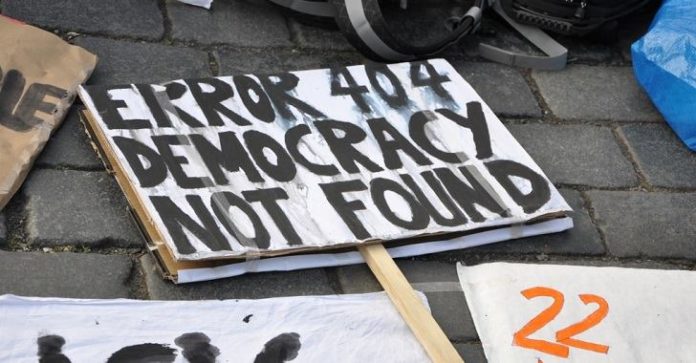
By Carey Wedler at theantimedia.org
The United States is no longer a full democracy, according to an annual report recently released by The Economist. The Economist Intelligence Unit’s ninth annual Democracy Index details the decline of democracy not just in the U.S., but also around the world.
The rankings cover 165 countries and are determined by a variety of factors. The report (which is downloadable upon registration explains):
“The Democracy Index is based on five categories: electoral process and pluralism; civil liberties; the functioning of government; political participation; and political culture. Based on their scores on a range of indicators within these categories, each country is then itself classified as one of four types of regime: ‘full democracy’; ‘flawed democracy’; ‘hybrid regime’; and ‘authoritarian regime.’”
The number of countries ranked as “full democracies” fell from 20 to 19 in 2016, and the U.S. came in at 21 — earning the designation of a “flawed democracy.” The report explains that the U.S.’ quality of democracy has declined “ as popular confidence in the functioning of public institutions has declined.” The U.S. now ranks behind Japan, which was the highest ranked flawed democracy.
Following the chaos of the 2016 election, it is unsurprising that many Americans are losing faith in democracy. But as the report notes, Donald Trump is not entirely to blame.
“Popular trust in government, elected representatives and political parties has fallen to extremely low levels in the US… This has been a long-term trend and one that preceded the election of Mr Trump as US president in November 2016.”
In fact, it appears Trump simply capitalized on existing sentiments:
“By tapping a deep strain of political disaffection with the functioning of democracy, Mr Trump became a beneficiary of the low esteem in which US voters hold their government, elected representatives and political parties, but he was not responsible for a problem that has had a long gestation.”
The U.S. government’s attacks on civil liberties and many failed policies have become hallmarks of American policy. Unsurprisingly, the U.S. has slipped in both press and economic freedom in recent years.
But the U.S. is far from alone in its decline as “[p]opular confidence in political institutions and parties continues to decline in many other developed countries, too.”
“Some 72 countries experienced a decline in their total score compared with 2015, almost twice as many as the countries which recorded an improvement (38),” the analysis explains.
Fifty-seven countries stagnated. Eastern Europe suffered the worst losses, with 19 countries slipping in the democracy index. Countries that were deemed to be “full democracies” included Norway at number one, followed by Iceland, Sweden, New Zealand, Denmark, Canada, Ireland, Switzerland, and several other European countries. Uruguay ranked 20th, outpacing other Latin American countries.
The number of authoritarian governments totaled 51. “Around 2.6bn people, more than one-third of the world’s population, live under authoritarian rule, with a large share being, of course, in China,” the report notes, adding that “‘[h]ybrid’ and ‘authoritarian’ regimes are concentrated in Sub-Saharan Africa (36), the Middle East and North Africa (18 out of 20 countries), and to a lesser extent in eastern Europe (15) and Asia (13).”
Though according to the index, democracy appears to be working for some nations, others are struggling to uphold the system’s purported ideals. “Since 2006 The Economist Intelligence Unit (EIU) has recorded a decline in the average aggregate global democracy score, from 5.62 to 5.52 in 2016,” the report notes, adding that Western Europe, North America, and Eastern Europe experienced the most declines – even as many Western European nations retained their categorization as full democracies.
These losses parallel global opinions, which increasingly reflect a loss of faith in democracy. As the report asserts, even those countries that often boast of their democratic history are crumbling:
“The crisis of democracy is expressed in the failing traditional political party system; the growing gap between elites and electorates; and the rise of populist parties. The contemporary problems of democracy are clearly not just ‘over there’—in Russia, China, the Middle East or Africa. Democracy is in trouble in the West, in the mature democracies of western Europe and the US, which are no longer obvious beacons for those striving for democracy in the nondemocratic world.”
This article (U.S. No Longer Considered a ‘Full Democracy’ — and It’s Not Trump’s Fault) is free and open source. You have permission to republish this article under a Creative Commons license with attribution to Carey Wedler and theAntiMedia.org.




